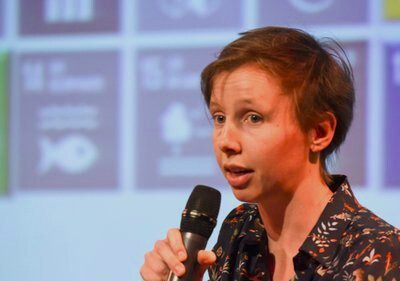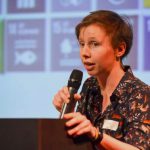
Development of ‘World Food and Ecosystems’ course: three necessary skills for (big) data collection
Lies Jacobs (FNWI) was awarded the TLC Didactic Innovation grant (formerly UvA Education Innovation Grant) in the 2021-2022 academic year to further develop the course ‘World Food and Ecosystems‘. The grant was a starting point for her to focus on teaching students three skills needed for (big) data collection: building self-confidence, essential coding skills and digital independence. These skills are important for students to navigate the world of (big) data collection and processing in the environmental sciences, which is becoming increasingly complex.
Read below her interesting story and how she experienced further development of the course with the grant.
Analysis of food-related problems and possible solutions
 “Different parts of the world have different biomes, strongly related to global climate zones and abiotic conditions. In the ‘World Food and Ecosystems’ course, we study the main biomes, their basic function, spatial patterns and internal structure. And their role in relation to food supply. Students learn to apply digital data (maps, measurements and images) for the analysis of food-related and ecological problems .”
“Different parts of the world have different biomes, strongly related to global climate zones and abiotic conditions. In the ‘World Food and Ecosystems’ course, we study the main biomes, their basic function, spatial patterns and internal structure. And their role in relation to food supply. Students learn to apply digital data (maps, measurements and images) for the analysis of food-related and ecological problems .”
Building self-confidence, skills and self-reliance step by step
“The learning objectives of this course are for the student to be able to explain how biotic, abiotic and anthropogenic processes influence patterns in ecosystems and food production systems. But also, how they have evolved in the past and how they may evolve in the future. That the student is able to analyse patterns/processes and their interactions that determine food and ecosystems in the world using large spatial datasets. And that the student is able to apply the coding concepts (in R and Google Earth Engine) that student has seen during the practical to new problems at the interface of food and ecosystems.”
“Most students have already come into contact with a programming language when they do the World Food and Ecosystems course. Yet, as teachers, we find that students are often put off by ‘programming’ and soon drop out because they don’t think they have the right skills. We would therefore like to increase students’ self-reliance and self-confidence in this subject. We do that by slowly working towards that. We build that self-confidence step by step just autonomous exercises. After all, learning to code is a process with a lot of trial and error where belief in one’s own ability is the first necessary step.”
Working towards self-confidence and autonomy
“To work step by step towards self-confidence and skills in programming, we built a web page where students can consult instructions. We apply Scaffolding. This means that through the computer practicals, students build on previous knowledge (from previous courses) and on the material from the previous practicals. The instructions in the first practical are very literal and very explicit, step by step. As the subject progresses, the student is expected to have more and more autonomy, own interpretation and problem-solving thinking in the practicals.”
“Throughout the instructions, there are also regular small quiz questions that probe the student’s understanding, so that we educators can also make some adjustments along the way where necessary. During the computer practicals, there is therefore a lot of guidance from educators and a student assistant: students are thus helped as quickly as possible if they get stuck so that motivation remains as high as possible. We also organise interaction moments for students with practical teachers for tailor-made guidance. Finally, students receive a final assignment in line with the practicals, where they work on the problem autonomously. But they can also count on intervision moments with the lecturers.”
Sustainable self-reliance and autonomy, also after studies
“With this grant, I wanted to increase students’ self-sufficiency in using large datasets even after their studies. To understand patterns and processes in world food and ecosystems, the use of large datasets is very useful: at World Food and Ecosystems, we therefore wanted to familiarize students with the different datasets and tools available for this today.”
“In addition, we must also recognise that the world of big data, for example in the form of remote sensing data and (programming) tools developed for their analysis, are subject to rapid change. We therefore also want to contribute to students’ self-reliance in dealing with these new data and tools. And cultivate an autonomy that enables them to continue to do so in the future.”
The TLC Didactic Innovation grant is the starting point of an engaging journey!
“Awarding the grant was the ideal opportunity to invest in revising the practicals. But every year we get feedback from students to make them better and adapt them to their experiences. So the grant process is, in my opinion, a work in progress. The improvement continues even after the grant period. The grant has mainly been an encouragement and motivation to work on editing this subject with attention and a mandate. With each practicum, we have new ideas to improve the implementation and better achieve the objectives. In my opinion, this is the greatest achievement of the grant: it has been an encouragement to innovate teaching and also to continuously question and improve this innovation.”
“I am also very grateful for all the support, thinking and commitment of the educators who run the computer practicals. They are indispensable for the development of such innovations and have a wealth of knowledge when it comes to students and their challenges and feedback.”
“I regularly participated in interim meetings with the other grant holders. I found these meetings especially useful for brainstorming practical implementation challenges. My advice to educators in a grant programme: it is normal that not everything goes perfectly the first year. See the TLC Didactic Innovation grant as a starting point of an engaging journey!”






